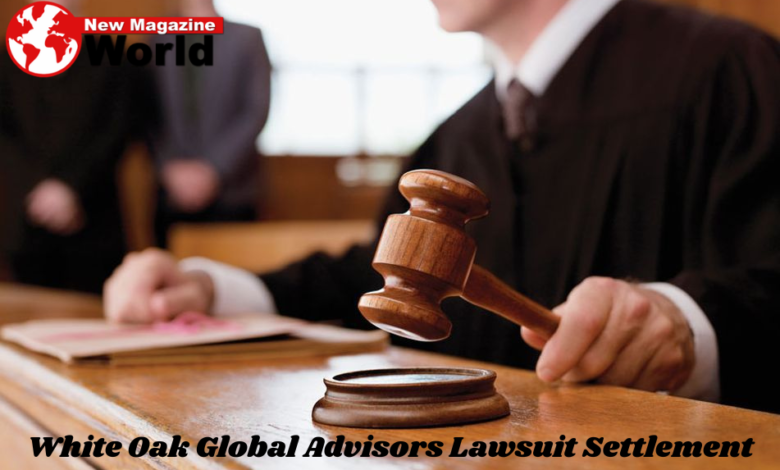An In-Depth Look at the White Oak Global Advisors Lawsuit Settlement

Introduction to White Oak Global Advisors
White Oak Global Advisors is a prominent private credit investment firm based in San Francisco. Founded in 2007, the firm has established itself as a leader in providing customized financial solutions to small and medium-sized enterprises (SMEs). With a focus on disciplined investing, White Oak has grown its presence in the financial sector, managing billions of dollars in assets. However, the firm has faced its share of challenges, including legal disputes. One of the most significant of these was the White Oak Global Advisors lawsuit settlement, which had far-reaching implications for the firm and the financial industry at large.
Background of the White Oak Global Advisors Lawsuit
The White Oak Global Advisors lawsuit originated from a series of allegations brought forward by investors and other parties who claimed that the firm had engaged in misconduct and mismanagement of funds. These allegations included accusations that White Oak had breached its fiduciary duties, failed to adhere to agreed-upon investment strategies, and did not act in the best interests of its investors. As the legal battle unfolded, it became clear that a resolution was necessary to prevent further damage to the firm’s reputation and financial standing. This led to the eventual White Oak Global Advisors lawsuit settlement.
Key Parties Involved in the White Oak Global Advisors Lawsuit Settlement
The White Oak Global Advisors lawsuit settlement involved multiple parties, each with its own set of grievances and demands. Among the most prominent parties were institutional investors, private equity firms, and other financial entities that had invested in White Oak’s funds. These parties claimed that they had suffered significant financial losses due to the firm’s actions, prompting them to seek legal recourse.
Institutional Investors: Large institutional investors, such as pension funds and insurance companies, were among the plaintiffs in the lawsuit. They argued that White Oak’s failure to uphold its fiduciary duties had resulted in substantial financial harm.
Private Equity Firms: Several private equity firms also joined the lawsuit, alleging that White Oak had not fulfilled its contractual obligations and had deviated from agreed-upon investment strategies.
Legal Representation: Both sides in the lawsuit were represented by prominent law firms with extensive experience in financial litigation. These legal teams played a critical role in negotiating the terms of the White Oak Global Advisors lawsuit settlement.
Terms and Conditions of the White Oak Global Advisors Lawsuit Settlement
The White Oak Global Advisors lawsuit settlement was a complex agreement that involved several key provisions. These provisions were designed to address the concerns of the plaintiffs, compensate for the alleged financial losses, and ensure that similar disputes would not arise in the future.
Financial Compensation: One of the central components of the settlement was financial compensation to the plaintiffs. White Oak agreed to pay a significant sum to settle the claims, although the exact amount was not disclosed to the public. This compensation was intended to cover the financial losses that the plaintiffs claimed to have incurred as a result of White Oak’s actions.
Operational Reforms: In addition to financial compensation, the settlement required White Oak to implement a series of operational reforms. These reforms included changes to the firm’s investment strategies, enhanced transparency in its communications with investors, and stricter adherence to fiduciary responsibilities. The goal of these reforms was to restore investor confidence and prevent future legal disputes.
No Admission of Guilt: As is common in many settlements, the White Oak Global Advisors lawsuit settlement included a clause stating that the firm did not admit to any wrongdoing. White Oak maintained that it had acted lawfully and that the settlement was reached to avoid the costs and uncertainties associated with prolonged litigation.
Impact of the White Oak Global Advisors Lawsuit Settlement on the Firm
The White Oak Global Advisors lawsuit settlement had a profound impact on the firm, affecting both its operations and its reputation within the financial industry. While the settlement allowed White Oak to put the legal dispute behind it, the firm had to contend with the consequences of the lawsuit.
Reputational Damage: The lawsuit and subsequent settlement cast a shadow over White Oak’s reputation. The firm, once seen as a leader in the private credit space, faced increased scrutiny from investors and regulators. The White Oak Global Advisors lawsuit settlement served as a reminder of the importance of maintaining high ethical standards and transparency in financial management.
Operational Changes: In response to the settlement, White Oak implemented a series of operational changes designed to address the issues raised by the plaintiffs. These changes included enhanced transparency in reporting, more rigorous compliance with regulatory requirements, and a renewed focus on protecting investors’ interests. These reforms were critical in rebuilding trust with investors and preventing future legal disputes.
Investor Confidence: The White Oak Global Advisors lawsuit settlement had a mixed impact on investor confidence. While some investors were reassured by the firm’s willingness to settle and implement reforms, others remained cautious. White Oak had to work diligently to demonstrate its commitment to ethical practices and regain the confidence of its investors.
Broader Implications of the White Oak Global Advisors Lawsuit Settlement for the Financial Industry
The White Oak Global Advisors lawsuit settlement also had broader implications for the financial industry, particularly in the realm of private credit and alternative investments. The settlement highlighted the need for greater transparency, accountability, and oversight in these areas.
Increased Regulatory Scrutiny: The settlement brought attention to the regulatory environment surrounding private credit and alternative investments. Regulators may now increase their focus on these sectors, leading to more stringent regulations and oversight. This could have a lasting impact on how firms like White Oak operate and manage their funds.
Industry Best Practices: The White Oak Global Advisors lawsuit settlement prompted discussions about industry best practices. Firms across the financial industry may need to review and update their policies to ensure they align with evolving standards. This includes enhancing transparency, ensuring that fiduciary duties are upheld, and maintaining clear communication with investors.
Legal Precedents: The settlement may also set legal precedents that could influence future lawsuits involving private credit and other alternative investments. Lawyers, regulators, and financial professionals are likely to study the White Oak Global Advisors lawsuit settlement closely to understand the potential risks and responsibilities associated with managing these types of investments.
Lessons Learned from the White Oak Global Advisors Lawsuit Settlement
The White Oak Global Advisors lawsuit settlement offers several important lessons for the financial industry. These lessons are particularly relevant for firms operating in the private credit and alternative investment spaces, where transparency, accountability, and ethical practices are paramount.
Importance of Fiduciary Duties: The lawsuit and settlement underscored the critical importance of fiduciary duties in financial management. Firms must prioritize the interests of their investors and ensure that they adhere to agreed-upon investment strategies. Failure to do so can lead to significant legal and financial consequences.
Transparency and Communication: The White Oak Global Advisors lawsuit settlement highlighted the need for transparency and clear communication between firms and their investors. By providing timely and accurate information, firms can build trust with their investors and avoid potential legal disputes.
Proactive Risk Management: The settlement serves as a reminder of the importance of proactive risk management. Firms must identify and address potential risks before they escalate into legal disputes. This includes implementing robust compliance programs and regularly reviewing investment strategies.
Conclusion
The White Oak Global Advisors lawsuit settlement represents a significant event in the financial industry, with lasting implications for both the firm and the broader sector. The settlement highlighted the importance of transparency, accountability, and investor protection in financial management. For White Oak, the settlement was a turning point, prompting the firm to make important changes to its operations and rebuild trust with its investors.
As the financial industry continues to evolve, the lessons learned from the White Oak Global Advisors lawsuit settlement will likely influence the behavior of investment firms, regulators, and investors alike. In a world where trust and transparency are paramount, this settlement stands as a testament to the importance of upholding these values in the management of private credit and alternative investments.





